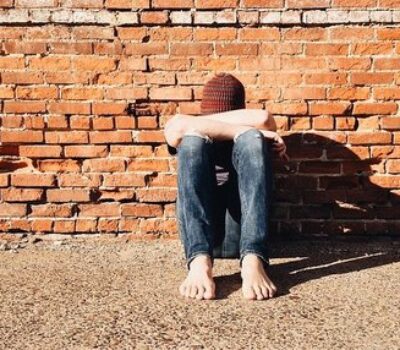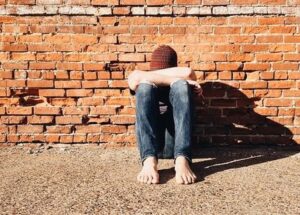“Why are we all so broken? Why is this world so hard, so brutal and unforgiving, that we can’t navigate it without hurting ourselves? Why does trying to be helped and healed feel like scaling a mountain that just keeps getting higher and higher?” -The Secrets We Keep by Kate Hewitt
It’s a struggle that I’ve heard in so many ways over years of working with trauma survivors, yet this specific quote came from a summer book club. How did our culture end up here, when trauma makes its appearance in an enthralling beach read? Maybe trauma has increased, affecting more people more often. This seems unlikely, considering that crime rates in the US have barely shifted in decades. Maybe children are more neglected than in the past, but that also doesn’t seem like it fits. “Parenting” became its own verb, and “childhood” it’s own unique stage in just the last several decades. Yet more people are experiencing the negative effects of trauma. One estimate suggests that 90% of people with substance use disorders also struggle with trauma symptoms.
So what’s the deal, and what is Harris House planning to do about it? Read on to learn more!
Trauma: A Brief History
The history of trauma terminology has its roots in the history of modern warfare. Soldiers from both world wars arrived home frayed, and changed. “Shell shocked” was the terminology at the time. The Vietnam War lined up with a boom in the study of psychology, and a specific set of measurable symptoms was labelled “post traumatic stress disorder”. In the 1970’s, helping professionals were also struggling to help define the aftermath of sexual assault on (largely) women, but post traumatic stress disorder (PTSD) was considered an outcome exclusively for returning war veterans. Survivors and helping professionals needed some way of communicating about the impact of assault, so the term “rape trauma syndrome” was coined. Eventually, the term PTSD began to be used across the board, regardless of the source of trauma. In recent decades, “post trauma symptoms” has been used to describe any after effect of trauma, regardless of how long it has lasted or how many symptoms a person is experiencing.
Partially, the increase in trauma can be explained by improved assessment and inclusive terminology. With inclusive language, more people can define their experiences and access treatment. The second explanation is that resilience has shifted.
Are humans less tough than we used to be?
Kind of, but only because the factors that improve mental toughness, also known as resilience, have drastically shifted. Opportunities to build resilience have reduced, while stressors have increased and major traumatic events have remained steady.
For more on this, we can look to Robert Sapolsky’s studies on stress, and Robert Putnam’s research on community.
Sapolsky notes that most animals do not develop post traumatic stress disorder, despite a true lifelong struggle for daily survival. This doesn’t seem to make sense. If an antelope is chased to near death by a lion about once a week, shouldn’t that antelope be at risk for PTSD? There are two main reasons why humans are sensitive to stress in a way that antelopes are not. The first is that antelopes face a very small number of semi-predictable stressors. Being able to predict a stressor is a major way that antelopes protect themselves from it being stressful in a damaging way. Secondly, every single time an antelope faces a main stressor, their very survival depends on responding in a physical way that counteracts the stress itself. Here’s an example of how this plays out.
A Day in the Life of an Antelope
7am Hunt for Food
8am Hear a lion in the woods
8:01am Experience stress chemistry
8:02am Use stress chemistry to fight or flee lion
8:10am Fleeing lion triggered de-stressing chemistry
8:15am Back to calm. Back to hunting for food. The end.
Humans, by contrast, face unpredictable and frequent stressors throughout the day. They also rarely have physical ways to respond to stress regularly built into their day. Most people’s modern lifestyle requires very little physical movement at all, making humans less mentally tough and more vulnerable to stress. More unpredictable stressors + less opportunity for physical response to stressors = more vulnerability to trauma symptoms. Here’s an example of how this plays out for humans.
A Day in the Life of a Modern Human
7am Roll out of bed to the sound of an alarm (stress chemistry spike)
7:01am Think of everything that has to be done today (spike #2)
7:05am Scroll social media (spike #3)
7:10am Respond to pets or kids (spike #4)
7:30am Use caffeine or a high sugar breakfast to get going (spike #5)
7:45am Run a bit late (spike #6)
8:00am Traffic (spike #7)
8:01am Phone dings (spike #8)
8:05am Worry about the future (spike #9)
8:15am Phone dings again (spike #10)
And it goes on. It’s easy to predict ten spikes in stress chemistry, and no natural way to physically fight or flee from those stressors. THIS is how life becomes traumatic.
Finally, research shows that connection and community reduce the impact of trauma on a person. For example, military members who deploy alone are more at risk for developing PTSD than military units who deploy together. In fact, deploying alone will leave a person more sensitive to lower levels of traumatic events (say, hearing an explosion in the far distance) than military units who engage in direct combat.
The research goes on to explain that a single negative response to one’s trauma story has an exponentially more negative impact than the positive impact of a supportive response. In other words, a single positive response adds $1 to your trauma free bank account, but a single negative response takes away $5. In order to heal from trauma, people need as few negative responses as possible and as many positive responses.
Robert Putnam’s research shows that modern American culture has fewer of these opportunities for positive responses to the traumas of life than in past decades. Churches have dwindled, families are more divided (emotionally and physically), and community clubs have nearly disappeared. Lack of connection with others leaves people more vulnerable to the traumas of everyday life as well.
So what to do?
First off, breathe a big sigh of relief. You’re not crazy. Life is objectively harder in some ways because of the support we lack, and the smaller number of opportunities to physically fight off our stressors. If we fought off a bear, we’d get that jolt of de-stressing chemistry. But how does one punch a thought in the nose? Or run away from the regular pings of the smartphone?
It turns out, there are very specific and effective skills that can be learned. In modern culture, fighting the bear has to be done by a daily deep breathing practice, or stretching. We can’t punch a thought, but we can learn to make stressful thoughts more predictable, and choose reponses to them in the moment. We can cultivate more awareness and acceptance, while also building a toolbox for dealing with life when things get overwhelming.
Harris House strives to be at the forefront of evidence-based treatment, and the evidence indicates that treating trauma should begin as soon in treatment as possible. This doesn’t mean that clients are encouraged to talk about their deepest, darkest hardships as soon as they walk in the door. In fact, dozens of coping skills can be used before talking about traumatic events ever happens.
In a small, private group of clients, individuals begin learning the coping skills they need to address their trauma, while also getting the social support that they need to build mental toughness. Groups are facilitated by a therapist, and are held daily for a one week period. New clients are able to join a new group, but are not incorporated into existing groups. This improves the opportunity for strong connections to form within a group.
Individual therapists are trained to identify and address trauma symptoms, incorporating trauma-sensitive therapy into client’s aftercare plans. Trauma work can begin at Harris House through skill-building, and continue at lower levels of care within Harris House or through connections with community providers. It would be unfair to remove a client’s main coping skill (a substance) without immediately beginning to replace it with other skills, to insure long term success in recovery.
The journey isn’t easy, but it’s full of hope and possibility. If you, or someone you know, are struggling with trauma and substance use, please reach out to talk today.









